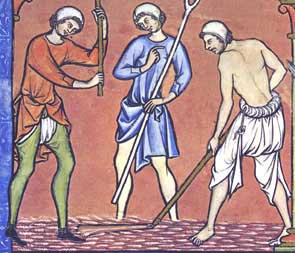Difference between revisions of "Braies"
From AmtWiki
m (removed unnecessary category) |
(Removed copypasta) |
||
| Line 1: | Line 1: | ||
| − | + | {{stub}} | |
| − | |||
| − | |||
| − | |||
| − | |||
| − | |||
| − | |||
[[Image:Braies.jpg.jpeg|thumb|Example of English [[garb]] 13th century. The men wear [[tunics]] called [[cottes]] that were split in the front so that they could be tucked in to their [[belts]] for ease of movement. They also wear [[trewes]] and [[braies]]. This is typical working man's attire.]] | [[Image:Braies.jpg.jpeg|thumb|Example of English [[garb]] 13th century. The men wear [[tunics]] called [[cottes]] that were split in the front so that they could be tucked in to their [[belts]] for ease of movement. They also wear [[trewes]] and [[braies]]. This is typical working man's attire.]] | ||
| + | |||
| + | [[Braies]] are a type of [[trouser]] that hung to the knees or mid-calf, similar to what we today call shorts. By the later middle ages, they were worn exclusively as undergarments, worn under [[hose]] or other forms of trousers. | ||
| + | |||
| + | ===In history=== | ||
The 12th and 13th c. men's underwear, known as Braies or Breeches were a long | The 12th and 13th c. men's underwear, known as Braies or Breeches were a long | ||
legged full garment, shaped somewhat like pantaloons with a long flap at the top that is | legged full garment, shaped somewhat like pantaloons with a long flap at the top that is | ||
| − | rolled down called the coulisse | + | rolled down called the coulisse 14th C. Braies seam to |
| − | |||
| − | |||
have straight legs and less fabric, although they still roll down at the hips. The length also | have straight legs and less fabric, although they still roll down at the hips. The length also | ||
shortens later in period. | shortens later in period. | ||
| − | + | Braies are made of white [[linen]], or [[wool]] for lower classes. Over the braies would | |
| − | + | be [[chausses]], tied onto the braies at the hips. | |
| − | |||
| − | |||
| − | |||
| − | |||
| − | |||
| − | |||
| − | |||
| − | |||
| − | |||
| − | |||
| − | |||
| − | |||
| − | |||
| − | |||
| − | |||
| − | |||
| − | |||
| − | |||
| − | |||
| − | |||
| − | |||
| − | |||
| − | |||
| − | |||
| − | |||
===Links=== | ===Links=== | ||
| − | *[http://camelot-treasures.com/aenor/braies.pdf | + | *[http://camelot-treasures.com/aenor/braies.pdf Making period braies] |
[[Category:Garb]] | [[Category:Garb]] | ||
[[Category:European Garb]] [[Category:Garb Bottoms]] | [[Category:European Garb]] [[Category:Garb Bottoms]] | ||
[[Category:Garb Undergarments]] | [[Category:Garb Undergarments]] | ||
Revision as of 01:11, 31 March 2016
Braies are a type of trouser that hung to the knees or mid-calf, similar to what we today call shorts. By the later middle ages, they were worn exclusively as undergarments, worn under hose or other forms of trousers.
In history
The 12th and 13th c. men's underwear, known as Braies or Breeches were a long legged full garment, shaped somewhat like pantaloons with a long flap at the top that is rolled down called the coulisse 14th C. Braies seam to have straight legs and less fabric, although they still roll down at the hips. The length also shortens later in period.
Braies are made of white linen, or wool for lower classes. Over the braies would be chausses, tied onto the braies at the hips.
